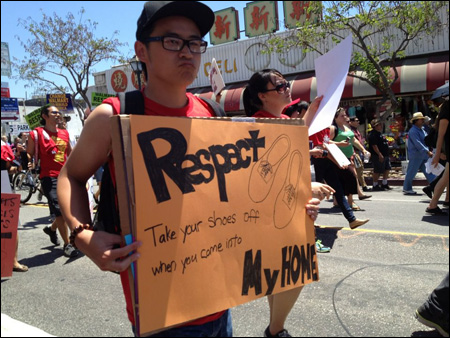from AngryAsianMan
A reflection on Waves.
I first learned of the metaphor of 'waves' of activist leanings from feminism. While arguably Eurocentric in its articulation, I still find it a helpful metaphor when considering some of the emergent sense of identity in being Asian in Australia.
Briefly, and from wikipedia:
1st Wave feminism
focuses on de jure inequalities (or sex/gender-based inequality enshrined in law)... The first of the most important struggles was/is of that to vote (to participate as full citizens in a nation).
"Women deserve the right to vote"
2nd Wave feminism
sees a slow shift to de facto inequalities (or sex/gender-based inequality enshrined in non-state-based institutional practices, as well as in socio-cultural norms). One of the major cultural issues I see at play here is, in particular, the importance of advocating for increased participation of women in historically demarcated 'male' or 'masculine' spheres of influence (e.g. 'public' spheres, managerial/government positions, etc.)
"Equal pay for Equal work!"
"Rights, not Roses!"
"The Personal is Political!"
3rd Wave feminism
sees yet another shifting disposition, into politicising the intersectionality of gender as one of and among many factors that constitute the lived material reality of women's lives. Thus a focus on pluralism, multiculturalism, inclusivity of sexual diverse, transnational discourse, migrant women's issues (as opposed, strictly, to woman-as-citizen) etc.
Here also: the 'reclamation' (or simple 'claiming') and radical valuation of positions historically constructed/demeaned as female/feminine: e.g. Slut-walks, 'lipstick feminism,' etc.
"The Master's tools will never dismantle the Master's house" (Audre Lorde)
"Stop slut shaming!"
Once again, I recognise that this is a very broad and sweeping brushstroke. I certainly do not mean to diminish the diversity and specificity of the actual histories and herstories of feminism(s) as it/they have unfolded til the present and hereafter.
My interest here is not in feminism per se,
but about the way that feminism, as a movement (or series of movements) has been historicised into 'waves'.
(i.e. my interest is not in history, but in historiography)
Can this metaphor of waves be helpful in considering the unfolding of postcolonial/diasporic Asian-ness (within Euro-/Anglo- American/Australian-dominant spaces)?
Here is a beginning stab at what this might mean:
1st Wave Poco Asian Politik
We see first the waves of migrants from Asian countries into European/White-dominated national settings, fighting around de jure inequalities... Most simply: To be regarded as naturalised citizens. Sometimes, historically, at least in the USA, as far as I know, this has taken on the fight by some ethnic migrants (particularly those of Indian and Japanese descent, as far as I am aware) to be regarded as "White" by the state (and thus be conferred citizenship).
"Let me be a citizen!"
2nd Wave Poco Asian Politik
We see new naturalised Asian citizens struggling around de facto inequalities, particularly pertaining to profession and cultural membership. These include being seen as individuals in highly individualistic cultures, politics of representation in historically white-dominant spaces. For some Asian men (certainly for myself), this can sometimes take on a body-politik of fashioning myself as passably 'masculine,' given Eurocentric body-/and behavioural norms.
"I speak English!"
"Asian men can be muscular / hot / athletic!"
3rd Wave Poco Asian Politik
Here, the issue of intersectionality... And also about the 'reclamation' (or simple 'claiming') and radical valuation of positions historically constructed as Asian/"Asiatic," particularly by those who experience the entitlements and privileges of citizenship.
"RESPECT: Take your shoes off when you come into my home"
Let's see how this one unfolds...
Acknowledging, for now, some of my limitations in this post:
Where women have been constructed as Euro-/White-/American women
and examples of Poco Asian Politik have been male...
No explicitly queer examples ------> >:(
Wanting to expand and rectify in future posts.

As in physics, wave works as a model. I'm initially cautious to see a model of the history of feminism applied to that of a much narrower struggle.
ReplyDeleteUnlike feminism, immigration has been a struggle older than history. And unlike feminism, there are places of our origins, e.g. Asia, where the natives don't understand our struggle. It hit me hard how incomprehensible identity politics are to natives in in rural Indonesia.
Hi Qian,
ReplyDeleteThank you for your excellent response!
Yes, I think you have correctly pointed out something here which is important to consider; particularly around the nationalist implications of applying this lens to what you have termed a much 'narrower' struggle. i.e. This may be 'helpful,' insofar as I am participating in a quest of belonging within a narrow region like the USA/Australia, but far less interesting or applicable when communicating other comprehensive ideals to folks in, say, rural Indonesia.
Perhaps, this is a problem of definition. Instead of saying "postcolonial/diasporic," I should have more properly just stated: "diasporic."
That said, I would question if this is necessarily a narrower struggle. I would be interested in whether, with Asian folks as one example, this model might be a helpful way to consider broader racial justice issues.